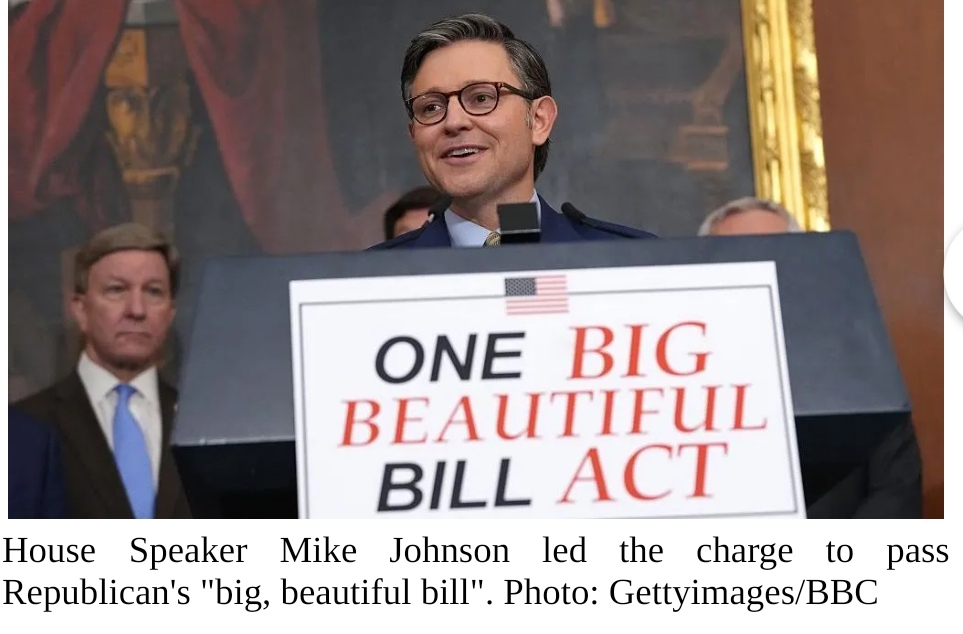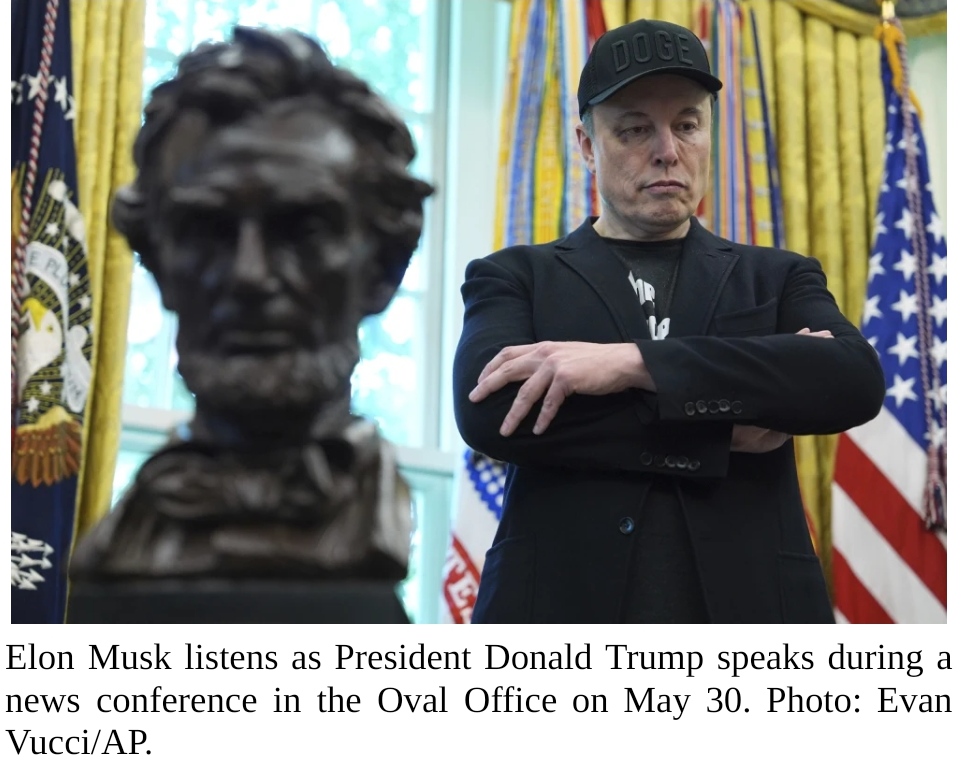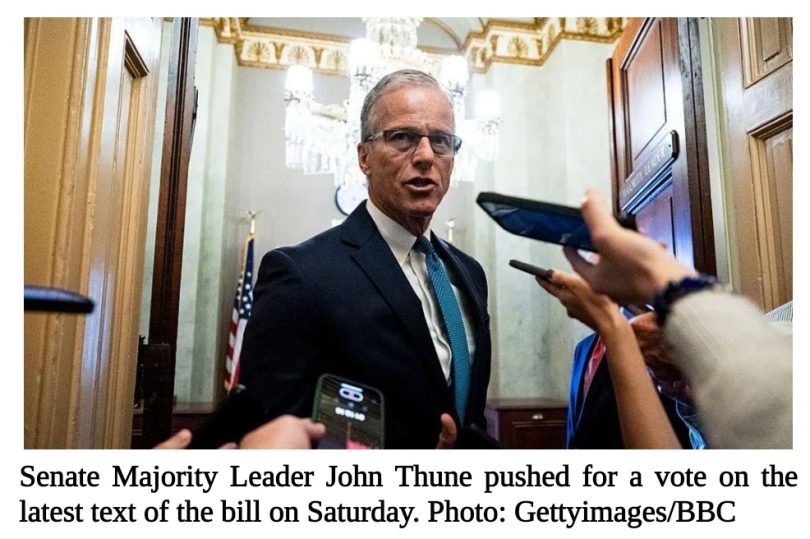Late Saturday night, after hours of tense negotiations and frantic hallway huddles, Senate Republicans took a major step toward advancing President Donald Trump’s long-promised legislative centerpiece: a sprawling tax-and-spend proposal branded by the president as his “big, beautiful bill.”
The 51-49 procedural vote opens formal debate on the multitrillion-dollar package, which proposes federal tax cuts, increased funding for the Pentagon and border enforcement, and reductions to safety-net programs like Medicaid. However, the bill’s future is uncertain, with several Republican senators demanding last-minute changes before offering their final support.
President Trump, eager to sign the legislation by July 4, has made this bill a political litmus test for party loyalty. “No excuses,” he posted earlier this week on Truth Social. “America needs this win.”
But winning, as always in Washington, comes at a cost — and for Republicans, that cost is increasingly steep.
Saturday’s vote saw Republican Senators Thom Tillis (N.C.) and Rand Paul (Ky.) break ranks, citing fiscal concerns and Medicaid cuts. Senator Ron Johnson (Wis.) initially joined them in opposition, only to flip his vote after eleventh-hour talks with Senate leadership.

Vice President JD Vance was dispatched to the Capitol to apply pressure where needed, making appearances both symbolic and strategic. As President of the Senate, he stood ready to break a potential tie, though in the end, it wasn’t necessary. Still, his presence underscored the moment’s political gravity.
In Majority Leader John Thune’s suite, Republican hardliners Johnson, Mike Lee (Utah), Rick Scott (Fla.), and Cynthia Lummis (Wyo.) engaged in intense negotiations, crafting new agreements. A notable concession was reportedly made to Senator Lisa Murkowski (Alaska), who had been a swing vote. Sources close to the discussions revealed that her support was secured, in part, by an unusual provision that broadened tax deductions for traditional Alaskan whalers.
From ideological disputes to home-state horse-trading, the fractures inside the GOP are visible and growing.
The Long Road to Passage.
The path forward is a procedural marathon. Senate Democrats are employing various delay tactics to impede the bill’s progress, including a complete reading of the 940-page document, a manoeuvre projected to consume 10 to 15 hours of floor time. Following this, debate will commence, leading to the notorious “vote-a-rama,” a protracted session where senators can propose an unlimited number of amendments, both political and substantive.
While typically viewed as political theatre, this ritual could be significant this time. Senator Susan Collins (R-Maine) has publicly indicated she may introduce her own amendments and could oppose the final bill if they are not accepted. Her influence is considerable, and her demands are anticipated to mould the bill’s ultimate form.

Further complicating matters, if the Senate passes a different version, a highly probable outcome, the bill must return to the House for reconciliation. House Speaker Mike Johnson, cognizant of his party’s precarious position, cautioned members during a Saturday call against public commentary on the Senate draft. “No posts on X,” he reportedly warned, a directive some members disregarded.
Trump and Musk on A Collision Course.
As the bill edged forward, opposition came from outside the chamber and from inside Trump’s own orbit. Billionaire entrepreneur and former White House adviser Elon Musk renewed his attacks on the legislation, blasting its price tag and policy direction.
“The latest Senate draft bill will destroy millions of jobs in America and cause immense strategic harm to our country,” Musk posted on X. “Utterly insane and destructive.”
Musk, who once led the now-defunct Department of Government Efficiency under Trump, has long criticized the bill’s projected $4 trillion impact on the deficit. He’s also taken aim at provisions reducing support for clean energy, which he believes unfairly target electric vehicle manufacturers like Tesla.
“Putting America in the fast lane to debt slavery,” Musk wrote.
Trump has dismissed Musk’s critiques as self-serving, suggesting the billionaire’s opposition stems from the bill’s rollback of EV tax credits.
Medicaid in the Crosshairs
Among the bill’s most controversial elements are proposed cuts to Medicaid, especially the capping of enrollment in the Affordable Care Act’s expansion programs. Senator Johnson, representing a state heavily reliant on federal health dollars, claimed a deal was struck to hold a vote on a related amendment, though he stopped short of guaranteeing support for the final bill.
Senator Tillis explicitly cited Medicaid cuts and their impact on rural hospitals as the reason for his “no” vote. “We’re hurting our own voters in some of the most vulnerable areas of the country,” he said in a hallway interview. “This isn’t fiscal conservatism, it’s fiscal negligence.”
In the House, Republicans like Rep. David Valadao (Calif.) and Jeff Van Drew (N.J.) echoed those concerns, suggesting Senate changes may threaten support in the lower chamber. “I don’t like it,” Van Drew said. “We had hit a sweet spot with our bill.”
While Trump may get his fireworks moment on Independence Day, the road there is anything but clear. Between procedural gauntlets, intra-party dissent, and Musk’s megaphone, the Senate’s version of the “big, beautiful bill” is as politically combustible as it is expensive.
For now, Majority Leader Thune has managed to herd just enough cats to stay on track. But the vote-a-rama looms, and with it, the very real possibility of amendments that could unravel the fragile consensus.
And if this bill dies, it won’t be Democrats who pulled the trigger. It’ll be Republicans, staring down the consequences of their own contradictions.
Written by Dr. Florence Omisakin








